Produce News
Nationwide Produce and Three Musketeers are donating 50p from every box of mint potatoes to support the Poppy Appeal
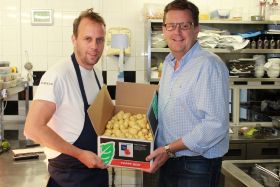
Nationwide Produce and Suffolk potato grower Three Musketeers will donate 50p to The Royal British Legion from every box of mint salad potatoes they sell during the three-week appeal.
After Edward Blanchard from Three Musketeers, and Nationwide’s Tim O’Malley, were moved by visiting Ypres, they decided to replace the mint leaf on packaging with a poppy in aid of the charity.
Backed by Michelin-starred chef Mark Poynton, the ‘Poppy Boxes’ went on sale on Wednesday 21 October at wholesalers and foodservice firms. O’Malley said: “This is a unique opportunity for buyers to support the Poppy Appeal while also backing British farming.
“We’re only five days into this promotion and the uplift in sales would already indicate that the amount we will raise for the Poppy Appeal will be closer to £15,000 than our original estimate of £10,000. The general reaction to this promotion from our customers has been very positive.”
Blanchard said it is “a great honour to help remember those that shouldn’t be forgotten” and asked the produce industry to support the initiative. “Chefs and buyers throughout the country, you can help us to raise some much-needed funds. Simply buy a product you already enjoy or swap from your usual supply and order a ‘Poppy Box’ of our Mint salad potatoes for the first time,” he said.
Researcher: ‘Change in dietary pattern from the traditional British diet substantially lowers risk’
Eating a diet full of fruit and vegetables can slash your risk of a heart attack by a third, according to new research.
Scientists measured blood pressure and heart disease risk factors like high cholesterol in 162 non-smoking men and women aged between 40 and 70.
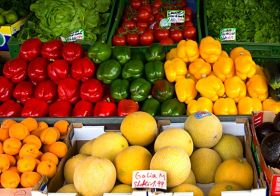
One group ate what was deemed a ‘traditional British diet’ high in saturated fat, salt and sugar, and low in fibre, oily fish and fruit and vegetables.
The other group consumed a diet full of fruit and vegetables, and lower levels of animal fat, that included oily fish once a week, and restricted sugar and salt intake.
Men and women in the “healthy diet” group were also asked to replace cakes and biscuits with fruit and nuts and supplied with cooking oils and spreads high in mono-unsaturated fats.
The healthy diet was linked to a significant fall in blood pressure, an average reduction in heart rate of 1.8 beats per minute, and an 8% fall in cholesterol levels.
The study, published in the American Journal of Clinical Nutrition, also found men and women over 40 who adapted their diet to meet UK Government guidelines reduced their risk of heart disease by up to a third.
Tom Sanders, of the study team, said: “Our findings apply to middle-aged and older people without existing health problems. This is important because most heart attacks and strokes occur in those not identified as being at high risk.
“We show that adherence to current dietary guidelines which advocate a change in dietary pattern from the traditional British diet (high in saturated fat, salt and sugar, low in fibre, oily fish and fruit and vegetables) would substantially lower that risk.”
Premium retailer said food sales in Christmas week were up a record 17%, and like-for-like sales grew by 0.1%
Marks and Spencer’s food business grew like-for-like sales by 0.1% in the 13 weeks to 27 December.
Total food sales rose by 2.8%, while sales in the Christmas week were up 17%.

The premium retailer said it had seen “record Christmas sales” in food, which “strongly outperformed the market”.
Despite a strong performance in the category, total like-for-like UK sales for the company fell by 2.7%, after a terrible performance in its general merchandise division, which includes womenswear, and where like-for-like sales were down 5.8%.
“Our food business delivered another excellent quarter, significantly outperforming the market by around three percentage points,” said CEO Marc Bolland.
“We saw record sales over the festive period, up 17% in the key Christmas week. Customers once again turned to us for our highly differentiated food offer, combining the best of quality, seasonal speciality and convenience, all at competitive prices.
“We launched nearly 750 new products giving customers more choice than ever, with record results in turkeys, party food, desserts and deli,” he said.
Bolland said disruption at the company’s Castle Donington distribution centre “strongly impacted” .com and general merchandise performance in December.
And he said overall international business was “heavily impacted” by the worsening currency and economic issues across its Middle East and Russia franchise region, but the business had performed well in other key markets such as India.
M&S will report its fourth quarter trading results on 2 April 2015.
The South African apple industry has taken a huge stride with the signing of the Apple Export Protocol enabling exports to China
After years of negotiation and dealing with technical issues, the South African Apple and Pear Producers’ Association (SAAPPA) has announced that the Apple Export Protocol to enable apple exports to China has been approved and signed.
The protocol was signed by the Minister of Agriculture, Forestries and Fisheries, Senzeni Zokwana and the Minister AQSIQ, Zhi Shuping, during a state visit to the People’s Republic of China in Beijing on 4 December.
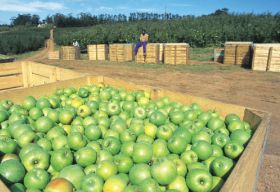
According to a statement issued by Hortgro on behalf of the SAAPPA, the deal culminates an eight-year process between the two countries and will enable the South African industry to expand its ever-broadening marketing footprint.
Tapping into the Chinese market has been a major priority for the industry for more than a decade and should act as a springboard to more effectively access other markets in Asia
Apples are currently exported to 8 primary destinations including Africa, the Far East and Asia, the UK, the Middle East, Continental Europe (including Russia) and smaller volumes to the Indian Ocean Islands, the US and Canada. By adding China to the destination list, Hortgro noted that the fruit industry will continue to create more job opportunities in primary and secondary agriculture. Further market access will also support further growth and economic development which in turn will enhance land reform transformation and new plantings in the industry.
A similar process to also open this market for South African pears has already started after which various other fruits, including stonefruit, will follow. It is trusted that the process to formalise further protocols will be fast tracked given that the fruit exporting industry could prove compliant with international best practice in terms of food safety and phyto-sanitary requirements.
In his reaction to the signing of the protocol, Nicholas Dicey, chairman of SAAPPA, expressed his sincere appreciation and thanks to the Ministry and Department of Agriculture, Forestry and Fisheries (DAFF), particularly the Plant Health and Plant Inspection divisions of the Department and South African Embassy personnel in Beijing, for their endeavours to finalise the protocol with their counterparts in China.
He also thanked industry technical specialists for their critical role in supporting the government officials with technical and scientific data over an extended period of time.
“This was a real team effort and augers well for future cooperation between industry and government”, he noted.
Anton Rabe, executive director of Hortgro, confirmed that the industry had been proactive in preparing for the possible export of apples from the 2015 season.
After the very successful verification visit of Chinese quarantine (AQSIQ) officials earlier in 2014, the industry has prepared the required orchard and export registration lists which could be provided to AQSIQ as soon as it is requested. Once the Chinese quarantine officials have approved and signed off on this list, exports could commence immediately.
Darijo Srna, of Shakhtar Donetsk, has bought 20 tonnes of tangerines for children in Ukraine suffering amid scenes of war
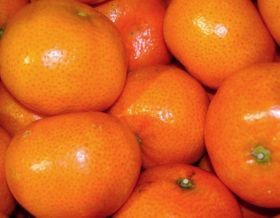
Shakhtar Donetsk’s Croatian international footballer and club captain Darijo Srna has bought 20 tonnes of tangerines for children in Ukraine, the Croatian daily Vecernji List has reported.
Srna was born in Metkovic, a region of southern Croatia well known for its tangerines. Croatia left communist Yugoslavia in 1991 and then fought a four-year war of independence.
“I grew up in Croatia so I also went through a period when I needed help. Donetsk has helped me a lot and this is just a small gift with which I want to pay them back,’ the daily newspaper quoted the 32-year-old as saying.
The Ukrainian top-flight side said on its website: “The lorries carrying the fruit bought in Darijo’s hometown Metkovi have already arrived in Donetsk.”
The tangerines will be distributed to at least 20,000 local children with a special greeting card for every child, the club statement said.
Supermarkets need to shut stores to save costs, as price cuts are ‘not enough’ to fend off competition from discounters
Retailers must shut down one in five of their stores in order to turn around flagging sales figures and reboot the grocery market, a report has said.
A large-scale closure programme is the “only viable solution” to return to profitable growth for the major supermarkets, the study found, and said price cuts alone will not win the battle against hard discounters Aldi and Lidl.
“We believe that any major price investments by Morrisons, Sainsbury’s or Tesco can be exceeded by the discounters,” said analyst Rob Joyce of report authors Goldman Sachs.
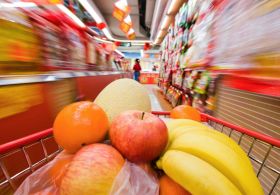
The report found that as over half of Tesco’s stores are bigger than 40,000 sq ft, the UK’s largest retailer will have the biggest problem.
And it said that multiple supermarkets would suffer like-for-like sales declines of three per cent a year until 2020, unless they begin to close stores.
“Our analysis of the UK grocery industry suggests capacity exit is the only viable solution for a return to profitable growth,” the report said.
The latest grocery share figures from Kantar Worldpanel, published today for the 12 weeks ending 9 November 2014, show that all the top four retailers have lost market share, while Aldi and Lidl have grown (up 25.5% and 16.8% respectively).
Fraser McKevitt, head of retail and consumer insight at Kantar, said: “The declining grocery market will be of concern to retailers as they gear up for the key Christmas trading season. The fight for a bigger share of sales has ignited a price war which means an average basket of everyday goods such as milk, bread and vegetables now costs 0.4% less than it did this time last year. This is bad news for retailers, but good news for shoppers with price deflation forecast to continue well into 2015.”